18 Oct 2021 | News, Statements, United Kingdom, United States
[vc_row][vc_column][vc_column_text]U.S. Department of Justice
950 Pennsylvania Avenue,
NW Washington,
DC 20530-0001
October 15, 2021
Attorney General Merrick Garland:
We, the undersigned press freedom, civil liberties, and international human rights advocacy organizations, write again to share our profound concern about the ongoing criminal and extradition proceedings relating to Julian Assange, the founder of Wikileaks, under the Espionage Act and the Computer Fraud and Abuse Act.
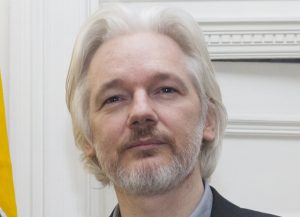
Julian Assange in 2014, photo: David G Silvers/CC BY-SA 2.0
In February, members of this coalition wrote to the Acting Attorney General, urging that the criminal charges against Mr. Assange be dropped. We now renew that request with even greater urgency, in light of a recent story in Yahoo News describing alarming discussions within the CIA and Trump administration before the indictment against Assange was filed. The Yahoo News story only heightens our concerns about the motivations behind this prosecution, and about the dangerous precedent that is being set.
As we noted in our earlier correspondence, the signatories to this letter have different perspectives on Mr. Assange and his organization. We are united, however, in our view that the criminal case against him poses a grave threat to press freedom both in the United States and abroad. We were disappointed that the Department of Justice appealed the decision by Judge Vanessa Baraitser of the Westminster Magistrates’ Court to reject the Trump administration’s extradition request. Especially in light of the recent news report, we urge you to drop that appeal and dismiss the underlying indictment.
As we explained in our earlier letter, journalists routinely engage in much of the conduct described in the indictment: speaking with sources, asking for clarification or more documentation, and receiving and publishing official secrets. News organizations frequently and necessarily publish classified information in order to inform the public of matters of profound public significance.
We appreciate that the government has a legitimate interest in protecting bona fide national security interests, but the proceedings against Mr. Assange jeopardize journalism that is crucial to democracy. In our view, a precedent created by prosecuting Assange could be used against publishers and journalists alike, chilling their work and undermining freedom of the press.
Major news organizations share this concern. The charges against Assange have been condemned by virtually every major American news outlet, even though many of those news outlets have criticized Mr. Assange in the past.
In light of these concerns, and in light of the shocking new reporting on the government’s conduct in this case, we respectfully urge you to drop the ongoing appeal of Judge Baraitser’s ruling and to dismiss the indictment of Mr. Assange. Respectfully,
(in alphabetical order)
Access Now
American Civil Liberties Union
Amnesty International USA
Center for Constitutional Rights
Committee to Protect Journalists
Defending Rights & Dissent
Demand Progress Education Fund
Electronic Frontier Foundation
Fight for the Future
First Amendment Coalition
Free Press
Freedom of the Press Foundation
Human Rights Watch
Index on Censorship
Knight First Amendment Institute at Columbia University
National Coalition Against Censorship
Open The Government
Partnership for Civil Justice Fund
PEN America
Project on Government Oversight
Reporters Without Borders
RootsAction.org
The Press Freedom Defense Fund of First Look Institute
Whistleblower and Source Protection Program (WHISPeR) at ExposeFacts[/vc_column_text][/vc_column][/vc_row]
8 Oct 2021 | Kazakhstan, Legal action against journalists, Media Freedom, News, Slapps, United Kingdom
[vc_row][vc_column][vc_column_text]
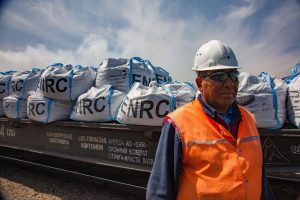
Metal Alloy plant. Worker in orange jacket and white hardhat on train with Eurasian Resources Group (ENRC). Alexey Rezvykh / Alamy Stock Photo
The undersigned organisations express their serious concern at the legal proceedings that have been filed in a UK court against journalist and author Tom Burgis, his publisher HarperCollins, and his employer the Financial Times (FT). Two lawsuits have been filed by Kazakh multinational mining company, Eurasian Natural Resources Corporation (ENRC), for what it claims are a series of “untrue” and “highly damaging” allegations made by the defendants about the company.
The first lawsuit, against Burgis and HarperCollins, centres around multiple passages in Burgis’ 2020 book Kleptopia: How Dirty Money is Conquering the World. The second lawsuit, against Burgis and the FT, relates to two FT articles by Burgis, eleven Twitter posts by Burgis based on the articles, and an FT podcast in which Burgis was interviewed about his investigation.
“We are extremely concerned that the lawsuits against Tom Burgis, HarperCollins, and the FT are Strategic Lawsuits against Public Participation (SLAPPs). SLAPPs are a form of legal harassment used by those with deep pockets to silence journalists and other public watchdogs by exploiting intimidatingly long and expensive legal procedures,” the undersigned organisations said.
The lawsuits filed in London follow earlier legal suits by ENRC in US courts against HarperCollins seeking disclosure of wide-ranging information relating to the publication of Burgis’ book and newspaper articles published in the FT. In the London lawsuits, ENRC claims that the publications defamed the company, including by falsely suggesting that it was involved in the deaths of two whistleblowers (former ENRC employees), whose bodies were found at a motel in Missouri in 2015.
A criminal investigation by the UK’s Serious Fraud Office into alleged corruption within ENRC opened in 2013 and is ongoing. It is understood to be focused on allegations of fraud, bribery and corruption around the acquisition of substantial mineral assets in the Democratic Republic of Congo and elsewhere. No charges have yet been brought. ENRC denies all allegations.
Since the SFO announced its investigation, ENRC has initiated a wave of more than 18 legal proceedings in the US and the UK against journalists, lawyers, investigators, contractors, and a former SFO official and the SFO itself. In June 2021, twenty-two organisations issued a statement condemning the ENRC’s lawsuits against public watchdogs.
“The lawsuits against Burgis, HarperCollins, and the FT are the latest in a deluge of litigation brought by ENRC as it attempts to robustly challenge corruption allegations,” the organisations said. “We are extremely concerned that ENRC’s legal tactics are a further attempt to silence those who interrogate any possible links between the company and incidents that warrant proper public scrutiny.”
“We urge the UK government to consider measures, including legal measures, that would protect journalists and other public watchdogs from abusive legal actions that are aimed at silencing them,” the organisations concluded. “Our democracy relies on their ability to hold power to account.”
The legal proceedings against Burgis, HarperCollins, and the FT were filed at the High Court of Justice of England and Wales on 27 August. The first hearing has yet to be scheduled.
Note to editors: ENRC was listed on the London Stock Exchange until 2013, when it became embroiled in controversy over governance issues and went private. Today it is owned by Eurasian Resources Group registered in Luxembourg. The ‘Trio’ who own the majority shares in ENRC (now ERG) are Alexander Machkevitch, Patokh Chodiev and Alijan Ibragimov. Mr Ibragimov died in February 2021. The Kazakh state owns an estimated 40 percent of the company.
SIGNED:
ARTICLE 19
Blueprint for Free Speech
Campaign for Freedom of Information in Scotland (CFoIS)
English PEN
IFEX
Index on Censorship
Justice for Journalists Foundation
Organized Crime and Corruption Reporting Project (OCCRP)
Osservatorio Balcani Caucaso Transeuropa (OBCT)
PEN International
Reporters Without Borders (RSF)
Rights and Accountability in Development (RAID)
Spotlight on Corruption
The Daphne Caruana Galizia Foundation
The European Centre for Press and Media Freedom
[/vc_column_text][/vc_column][/vc_row]
29 Sep 2021 | Afghanistan, Americas, Artistic Freedom Commentary and Reports, Asia and Pacific, Australia, Burma, Cuba, Ecuador, Europe and Central Asia, Israel, Lukashenko letters, Magazine, Magazine Contents, Middle East and North Africa, Religion and Culture, Russia, Syria, Turkey, Uganda, United Kingdom, United States, Volume 50.03 Autumn 2021, Volume 50.03 Autumn 2021 Extras
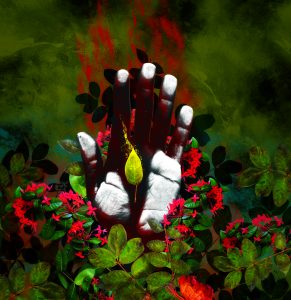
The Autumn issue of Index magazine focuses on the struggle for environmental justice by indigenous campaigners. Anticipating the United Nations Climate Change Conference (COP26), in Glasgow, in November, we’ve chosen to give voice to people who are constantly ignored in these discussions.
Writer Emily Brown talks to Yvonne Weldon, the first aboriginal mayoral candidate for Sydney, who is determined to fight for a green economy. Kaya Genç investigates the conspiracy theories and threats concerning green campaigners in Turkey, while Issa Sikiti da Silva reveals the openly hostile conditions that environmental activists have been through in Uganda.
Going to South America, Beth Pitts interviews two indigenous activists in Ecuador on declining populations and which methods they’ve been adopting to save their culture against the global giants extracting their resources.
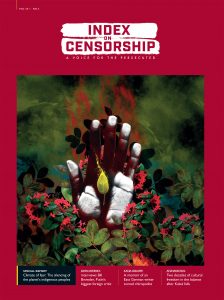 Cover of Index on Censorship Autumn 2021 (50-3)[/caption]
Cover of Index on Censorship Autumn 2021 (50-3)[/caption]
A climate of fear, by Martin Bright: Climate change is an era-defining issue. We must be able to speak out about it.
The Index: Free expression around the world today: the inspiring voices, the people who have been imprisoned and the trends, legislation and technology which are causing concern.
Pile-ons and censorship, by Maya Forstater: Maya Forstater was at the heart of an employment tribunal with significant ramifications. Read her response the Index’s last issue which discussed her case.
The West is frightened of confronting the bully, by John Sweeney: Meet Bill Browder. The political activist and financier most hated by Putin and the Kremlin.
An impossible choice, by Ruchi Kumar: The rapid advance of Taliban forces in Afghanistan has left little to no hope for journalists.
Words under fire, by Rachael Jolley: When oppressive regimes target free speech, libraries are usually top of their lists.
Letters from Lukashenka’s prisoners, by Maria Kalesnikava, Volha Takarchuk, Aliaksandr Vasilevich and Maxim Znak: Standing up to Europe’s last dictator lands you in jail. Read the heartbreaking testimony of the detained activists.
Bad blood, by Kelly Duda: How did an Arkansas blood scandal have reverberations around the world?
Welcome to hell, by Benjamin Lynch: Yangon’s Insein prison is where Myanmar’s dissidents are locked up. One photojournalist tells us of his time there.
Cartoon, by Ben Jennings: Are balanced debates really balanced? Ask Satan.[/vc_column_text][/vc_column][/vc_row][vc_row][vc_column][vc_custom_heading text=”Special Report” font_container=”tag:h2|font_size:22|text_align:left”][/vc_column][/vc_row][vc_row][vc_column][vc_column_text]

Credit: Xinhua/Alamy Live News
It’s not easy being green, by Kaya Genç: The Turkish government is fighting environmental protests with conspiracy theories.
It’s in our nature to fight, by Beth Pitts: The indigenous people of Ecuador are fighting for their future.
Respect for tradition, by Emily Brown: Australia has a history of “selective listening” when it comes to First Nations voices. But Aboriginal campaigners stand ready to share traditional knowledge.
The write way to fight, by Liz Jensen: Extinction Rebellion’s literary wing show that words remain our primary tool for protests.
Change in the pipeline? By Bridget Byrne: Indigenous American’s water is at risk. People are responding.
The rape of Uganda, by Issa Sikiti da Silva: Uganda’s natural resources continue to be plundered.Cigar smoke and mirrors, by James Bloodworth: Cuba’s propaganda must not blight our perception of it.
Denialism is not protected speech, by Oz Katerji: Should challenging facts be protected speech?
Permissible weapons, by Peter Hitchens: Peter Hitchens responds to Nerma Jelacic on her claims for disinformation in Syria.
No winners in Israel’s Ice Cream War, by Jo-Ann Mort: Is the boycott against Israel achieving anything?
Better out than in? By Mark Glanville: Can the ancient Euripides play The Bacchae explain hooliganism on the terraces?
Russia’s Greatest Export: Hostility to the free press, by Mikhail Khordokovsky: A billionaire exile tells us how Russia leads the way in the tactics employed to silence journalists.
Remembering Peter R de Vries, by Frederike Geeerdink: Read about the Dutch journalist gunned down for doing his job.
A right royal minefield, by John Lloyd: Whenever one of the Royal Family are interviewed, it seems to cause more problems.
A bulletin of frustration, by Ruth Smeeth: Climate change affects us all and we must fight for the voices being silenced by it.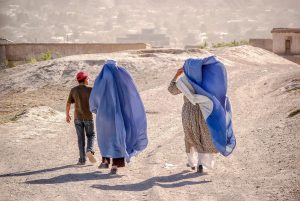 Credit: Gregory Maassen/Alamy[/caption]
Credit: Gregory Maassen/Alamy[/caption]
The man who blew up America, by David Grundy: Poet, playwright, activist and critic Amiri Baraka remains a controversial figure seven years after his death.
Suffering in silence, by Benjamin Lynch and Dr Parwana Fayyaz The award-winning poetry that reminds us of the values of free thought and how crucial it is for Afghan women.
Heart and Sole, by Mark Frary and Katja Oskamp: A fascinating extract gives us an insight into the bland lives of some of those who did not welcome the fall of the Berlin Wall.
Secret Agenda, by Martin Bright: Reforms to the UK’s Official Secret Act could create a chilling effect for journalists reporting on information in the public interest.
15 Sep 2021 | Awards, Egypt, Fellowship 2021, Kyrgyzstan, News, Niger, United Kingdom
[vc_row][vc_column][vc_images_carousel images=”117457,117451,117452,117454,117456,117458,117459,117460,117461,117462,117468,117469,117470,117471,117472,117463″ img_size=”full” speed=”3500″ autoplay=”yes”][vc_column_text]The winners of Index on Censorship’s 2021 Freedom of Expression awards have been announced at a ceremony in London hosted by actor, writer and activist Tracy-Ann Oberman.
The Freedom of Expression Awards, which were first held in 2000, celebrate individuals or groups who have had a significant impact fighting censorship anywhere in the world. Winners join Index’s Awards Fellowship programme and receive dedicated training and support. This year’s awards are particularly significant, coming as the organisation celebrates its 50th birthday.
Winners were announced in three categories – art, campaigning and journalism – and a fourth Trustees Award was also presented.
- The 2021 Trustees Award was presented to Arif Ahmed.
Arif Ahmed is a free speech activist and fellow at Gonville & Caius College at the University of Cambridge. In March 2020, Ahmed proposed alterations to the Statement of Free Speech at Cambridge. The proposed amendments were created to make the legislation “clearer and more liberal.” He aimed to protect university campuses as places of innovation and invention. That requires protecting the right to freely and safely challenge received wisdom.
- The 2021 Freedom of Expression Award for Journalism was presented to Samira Sabou.
Samira Sabou is a Nigerien journalist, blogger and president of the Niger Bloggers for Active Citizenship Association (ABCA). In June 2020, Sabou was arrested and charged with defamation under the restrictive 2019 cybercrime law in connection with a comment on her Facebook post highlighting corruption. She spent over a month in detention. Through her work with ABCA, she conducts training sessions on disseminating information on social media based on journalistic ethics. The aim is to give bloggers the means to avoid jail time. Sabou is also active in promoting girls’ and women’s right to freedom of expression, and wants to open her own news agency recruiting young people who want to be innovative in the field of information.
- The 2021 Freedom of Expression Award for Art was presented to Tatyana Zelenskaya
Tatyana Zelenskaya is an illustrator from Kyrgyzstan, working on freedom of expression and women’s rights projects. Zelenskaya has found inspiration for her work in the waves of anti-government protests that have recently erupted across Russia and Kyrgyzstan. In 2020, she created the artwork for a narrative video game called Swallows: Spring in Bishkek, which features a woman who helps her friend that was abducted and forced into an unwanted marriage. The game was downloaded more than 70,000 times in its first month. Its purpose is to break the silence around the issue of bride-kidnapping in Kyrgyzstan, with the aim of preventing them altogether.
- The 2021 Freedom of Expression Award for Campaigning was presented to Abdelrahman Tarek
Abdelrahman “Moka” Tarek is a human rights defender from Egypt, who focuses on defending the right to freedom of expression and the rights of prisoners. Tarek has experienced frequent harassment from Egyptian authorities as a result of his work. He has spent longer periods of time in prison and has experienced torture, solitary confinement, and sexual abuse. Authorities have severely restricted his ability to communicate with his lawyer and family. Tarek was arrested again in September 2020 and in December 2020, a new case was brought against him on terrorism-related charges. Tarek began a hunger strike in protest of the terrorism charges. In January 2021, he was transferred to the prison hospital due to a deterioration in his health caused by the hunger strike.
Index on Censorship chief executive Ruth Smeeth said: “As Index marks its 50th birthday it’s clear that the battle to guarantee free expression and free expression around the globe has never been more relevant. Inspired by the tremendous courage of our award winners, we will continue in our mission to defend free speech and free expression around the globe, give voice to the persecuted, and stand against repression wherever we find it”.
Trevor Philips, chair of the Index on Censorship board of trustees said: “Across the globe, the past year has demonstrated the power of free expression. For many the only defence is the word or image that tells the story of their repression; and for the oppressors the sound they fear most is diversity of thought and opinion. Index exists to ensure that in that battle, freedom wins – both abroad, and as this year’s Trustee award demonstrates here at home too.”[/vc_column_text][/vc_column][/vc_row]




 Cover of Index on Censorship Autumn 2021 (50-3)[/caption]
Cover of Index on Censorship Autumn 2021 (50-3)[/caption]
 Credit: Gregory Maassen/Alamy[/caption]
Credit: Gregory Maassen/Alamy[/caption]